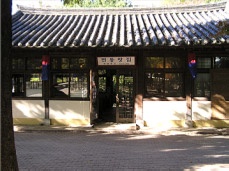The Korean Folk Village is home to numerous collections of Korean cultural artifacts, providing an opportunity for Korean children to experience and learn the culture of their ancestors firsthand. The site provides a venue to promote traditional Korean culture to both domestic and international visitors, and provides an open-air learning place for succeeding generations. The village has been developed to convey the wisdom and the spirits of our ancestors to both domestic and international tourists.
The lifestyle of Korean people, with a history extending back more than 5,000 years, abruptly changed following the Kabo Peasant War (1894), the Japanese invasion of Korea (1910-1945), and the Korean War (1950-1953). When the Korean economy surged in the 1960s, the Office of Cultural Properties started to value the establishment and operation of a folk museum. The economy, society, and culture in Korea underwent a tremendous change in pursuit of the Saemaeul Movement (movement for regional development), promoted nationwide in the 1970s. During this period, the government, influenced by the Foreigners' Tourism Promotion Policy, formed an advisory council on January 15, 1972 to research the establishment of the Korean Folk Village. Accordingly, the Korean Folk Village was founded on May 8, 1973, and the privatization of the Folk Village was officially approved by the government on September 18, 1973.
About 30 folk villages were relocated and recreated in the approximately 200,000 pyeong (660,000 square meters) vacant land around the area of 107 Bora-ri, Giheung-eup, Yongin City, Gyeonggi Province on August 5, 1973 and opened to the public after completion on October 3, 1974. The vacant land and buildings were gradually expanded starting in November, 1976. In September 2000, about 282 buildings and facilities were relocated and recreated on a nearby 220,000 pyeong (726,000 square meters) vacant lot and the site became a wor d-class outdoor museum with more than 400 empoyees.
The Korean Folk Village isopen all year-round and nearly 1.8 million domestic and foreign tourists visit here throughout the year. The Folk Village is a venue where visitors can learn Korean culture in a short time through the collection, preservation, research, exhibition, education and exchange of Korean cultural materials. It also provides an outdoor folk museum, already renowned as a world-class tourist attraction, so that visitors can experience the lifestyle of the Korean people. Already valued as a symbol of the Korean culture, the Korean Folk Village shall continuously endeavor to grow and be admired and acclaimed by people from around the world.
The Korean Folk Village is open all year-round.Open from Summer : 09:00 to 18:30, Winter : 09:00 to 17:00* Extended by 30 minutes on Weekend and Holidays
* Entrance allowed 1 hour before closing.
The village has reproduced over 260 traditional houses reminiscent of the late Chosun Dynasty and has recreated the life of Korean people through the exhibition of various household goods. In about twenty workshops, various handicrafts including pottery making, winnows, round bamboo baskets, bamboo ware, round willow baskets, Korean paper, brassware, knotting and embroidery, paper umbrellas, musical instruments, furniture, farming tools and accessories are exhibited. Overall, visitors can catch a glimpse of the lifestyle of the ancient Korean people in the 300,000 pyeong natural location, experience diverse traditional life at the Folk Village, and enjoy the museum in addition to the folk museum.
Korean Restaurant
This is a traditional Korean restaurant and can accomodate 400 people. On the menu are kalbijjim, bulgogi (barbecued beef), dolsot bibimbap (steamed rice with vegetables in a hot stone pot), yukejang (hot spicy stew soup), naengmyeon (cold buckwheat noodles in brot), and dumplings. For side dishes, hamuel pajeon and fried cuttle fish are prepared. Additionally, a Korean dinner is also prepared, but needs to be reserved beforehand by calling 031-288-2836.
Gilmok Jip
This is a traditional log cabin and can accomodate about 50 people. Bulgogi, Bibimbap, mushroom mung-bean pancakes and dotorimuk (acorn jelly) are sold.
Yangban Jang
This is a traditional log cabin and can accomodate about 60 people. For the meal, bulgogi, samgye-tang (chicken and ginseng soup), bibimbap, and someori gomtang (stew meat and tripe soup) are prepared. For dishes to go with liquor, deodeok-gui (grilled deodeok root), haemul pajeon, mung-bean pancakes and dotorimuk are sold.
Traditional Tea House
This is an octaganol-roofed building situated in the convenience facilities area after passing by the main entrance across from the office. Here, traditional tea such as medical herb tea, Korean ginseng tea, omija tea, boxthorn tea, gingko nut tea, and traditional drinks such as pumpkin soup, red bean soup, sweet cinnamon punch, and rice nectar are sold.
Fees
IndividualAdult: 15,000 KRW
Adolescents/Senior: 12,000 KRW
Child: 10,000 KRW
GroupsAdult: 12,000 KRW
Adolescents: 10,000 KRW
Child: 8,000 KRW
Map
Public Transportation
Gangnam St. - Yangjae - Highway - Singal - KFV (Express bus no. 5001-1)
Required Time : 40m
Suwon St. (Train/Subway) - Singal - KFV (City bus no. 37)
Required Time : 1h 10m
Suwon St. Square (Train/Subway) - KFV (Free Shuttle Bus)
Required Time : 30m
By car
If you arrive at the Singal Tollgate from Gyungbu Highway, Youngdong Highway, or Singal-Ansan Highway, or arrive at the Singal Five-Way Crossing by way of Gyungbu National Road, or Suwon-Yongin National Road, you can't miss the road signs leading you to the Korean Folk Village, which is about 3km away.
* For more information, call 82-031-288-0000
Contact
• Address : Korean Folk Village, 107 Bora-dong, Giheung-ku, Yongin City,
• Gyeonggi Province, Republic of Korea, 449-730
• Phone : 82-031-288-0000
• Fax : 82-031-286-4051
• E-mail : admin@ikfv.co.kr
• http://www.koreanfolk.co.kr/






No comments:
Post a Comment